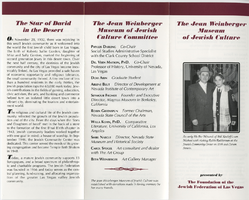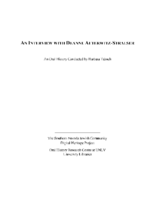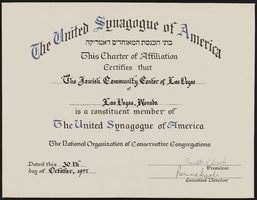Search the Special Collections and Archives Portal
Search Results
Audio clip from interview with Arne Rosencrantz by Barbara Tabach, February 18, 2015
Date
Archival Collection
Description
Part of an interview with Arne Rosencrantz on February 18, 2015. In this clip, Rosencrantz discusses his family heritage, childhood, and living in Las Vegas.
Sound
Audio from interview with Mike and Sallie Gordon, March 2, 1977
Date
Archival Collection
Description
Full interview audio with Mike and Sallie Gordon in March 1977 in which they discuss arriving in Las Vegas and their business enterprises.
Sound

Jean Weinberger Museum of Jewish Culture pamphlet, 1996
Date
Archival Collection
Description
A pamphlet for the Jean Weinberger Museum, presented by The Foundation of the Jewish Federation of Las Vegas.
Text

Transcript from interview with Sari and Paul Aizley by Barbara Tabach, November-December, 2015
Date
Archival Collection
Description
Paul and Sari Aizley discuss their many accomplishments as residents of Las Vegas, including those in education and with Jewish Family Service Agency.
Text

Transcript of interview with Deanne Alterwitz-Stralser by Barbara Tabach, November 1, 2014
Date
Archival Collection
Description
Interview with Deanne Alterwitz-Stralser with contributions from her son Daryl Alterwitz on November 1, 2014. In this interview Deanne talks about her Jewish upbringing near the Illinois-Indiana state line, meeting her first husband Oscar, with whom she had four children, and the difficulties with keeping kosher. The family moved to Las Vegas from Gary, Indiana for opportunities in the furniture business. Daryl weighs in on his father's personality, business decisions, and their move to Las Vegas. They discuss the location of the store the Alterwitz's bought (Walker Furniture) and purchasing the building from Jackie Gaughan, and the different tastes in furniture in Las Vegas. Then they talk about the Jewish community and the division between the east and west sides.
On New Year's Day, 1931, Deanne Alterwitz-Stralser was born Deanne Friedman in Hammond, Indiana, the daughter of an insurance salesman and a stay-at-home mom. Deanne spent her childhood in Calumet City, just across the state line in Illinois, and was raised with a strong Jewish identity. At the age of sixteen, she met her first husband, Oscar Alterwitz, at an Alpha Zadik Alpha (AZA) dance in Gary, Indiana, and the two were married in 1950. Deanne and Oscar settled in Gary, where they had four children?Aimee, Larry, Daryl and Linda?and took over the Alterwitz family furniture business. Eventually, the couple grew the business to three successful retail furniture stores. However, a decline in the city's safety and opportunities forced the Alterwitz's to consider relocating, and in 1973, after a family vote, Deanne and Oscar moved their family to Las Vegas. Upon arrival, Deanne and Oscar bought Walker Furniture from original owners, George and Ruth Walker. Deanne used her artistic eye and training from the Art Institute of Chicago to lead the design and merchandising elements of the business. Socially, Deanne integrated into the local Jewish community, and ensured her children participated in Jewish life as well. Deanne and Oscar's children still remained involved in Walker Furniture operations, including Daryl, who serves as the company's general counsel; Larry, who is the company's president; and a daughter who now oversees the store's design and merchandising.
Text

Program for National Conference of Christians and Jews event to honor Eileen Brookman, 1979
Date
Archival Collection
Description
In 1979, Eileen Brookman was honored as a Distinguished Citizen of the Year by the National Conference of Christians and Jews for her continued service to the community. The program includes highlights of her accomplishments.
Text

Jewish Community Center of Las Vegas membership certificate to The United Synagogue of America, October 30, 1957
Date
Archival Collection
Description
A membership certificate for The Jewish Community Center of Las Vegas. The text on the certificate reads: "The United Synagogue of America. This Charter of Affiliation certifies that The Jewish Community Center of Las Vegas of Las Vegas, Nevada is a constituent member of The United Synagogue of America. The National Organization of Conservative Congregations. Dated this 30th day of October, 1957. Bernath L. Jacobs, President. Bernard Segal, Executive Director."
Text

Transcript of interview with Renee Diamond by Barbara Tabach, November 20, 2014
Date
Archival Collection
Description
In this interview, Renee Diamond discusses coming to Las Vegas via Los Angeles, with her husband and children in the 1970s and getting involved in politics. She talks about her husband, Leo, and his business selling vinyl records in L.A., and her work in a doctor's office. Once in Las Vegas, the Diamonds joined Temple Beth Sholom and later Congregation Ner Tamid. Renee talks about her involvement in the political arena in southern Nevada, including the League of Women Voters.
Community activism and social justice rank high in the legacy of Renee Diamond. She often refers to herself as one of the last of the generation without college degrees that could make a difference in the politics of the state. When Renee, her husband Leo Diamond moved their family to Las Vegas from southern California, the energetic advocate Renee quickly plugged into the community. The word "No" was not part of her vocabulary. Among the many Jewish and secular activities the she engaged in were: the editorial board of the Jewish Reporter newspaper; Hadassah; Anti-Defamation League; Red Cross Board; State Museum Board to name a few. She remains a vibrant Democratic Party leader and served one term on the Nevada Assembly in 1989. She was on the front lines as a fierce and active supporter of Welfare Rights, Fair Housing and the Equal Rights Amendment. It is a life that included working alongside illustrious women and men of Southern Nevada history. A list that includes: Harriet Trudell, Ruby Duncan, Myrna Williams and Dorothy Eisenberg and many more mentioned here. Meanwhile she raised four children and enjoyed a loving 43-year marriage with Leo (aka "Uncle Leo") whose career included the popular Bingo Palace, Slots-A-Fun and Stations Casinos. During this oral history interview she recalls the Las Vegas that she moved to in 1972 and reflects on what attracted people here, ways to be part of the Jewish life which might even include a bowling league and how involvement in raising social awareness was a worthy investment of ones' time. This is a look at a woman who made a difference.
Text

Transcript of interview with Gary Sternberg by Barbara Tabach, February - April, 2015
Date
Archival Collection
Description
In this oral history, Gary explains how the family came to live in the United States?Cleveland and Los Angeles. In 1957, he married Noreen and they eventually came to live in Las Vegas where Gary worked for Sears selling washing machines, had a repair business and an importing business with Noreen. Gary was an entrepreneurial soul and inventive much like his father. He owns three patents.
On August 25, 1931, Augusta and Herman Sternberg welcomed their second child, Gerd (aka Gary), into the world of Cuxhaven, Germany. Augusta was a devout Christian of Polish ancestry who had fled Russian persecution. Herman was a German-born Jew salesman and inventor. The couple fell in love and had two children, Gary and Ruth who was a year and half older. By 1938, German politics were targeting Jews and Herman was ripped away from his Christian wife and children and sent to a concentration camp. Fate and friendship rescued Herman with the option to go to China. And so begins the history of the Sternberg family and how they all would eventually live together during World War II in the confines of a Jewish ghetto in Hongkew, China from May 1939 to July 1948. Gary had an extraordinary career as a dealer. He was not the stereotypical young dealer-to-be: he was in his 40s when he signed up for the Michael Gaughn Dealing School in the mid-1970s. Gary?s charming wit and ease of making friends soon gained him a position at El Cortez and then Caesars Palace. It was the same personality that would sustain his stellar thirty-one year career at Caesars. He was employed there from April 1974 until his retirement May 8, 2005. Though Jewish tradition would identify Gary as Christian, he self-identified as Jewish, officially converted and has been an active member of the Jewish community. Among his anecdotes-and he has many-is one about securing a $30,000 donation from Frank Sinatra and Jilly Rizzo for Congregation Ner Tamid.
Text

Transcript of interview with Sonja Saltman by Barbara Tabach, August 18, 2015
Date
Archival Collection
Description
Included in this oral history are reminiscences of Sonja Saltman's personal non-Jewish heritage in Austria, the importance of her grandmother in her life, and how she recalls becoming part of the Jewish community.
Sonja Saltman is a psychologist and philanthropist in Las Vegas, Nevada. She is executive director and co-founder of the Existential Humanistic Institute, a non-profit organization based in San Francisco, California that offers training in existential-humanistic therapy and theory. In 2003 Sonja and her husband Michael Saltman founded the Saltman Center for Conflict Resolution at the University of Nevada, Las Vegas (UNLV) William S. Boyd School of Law. The Saltman Center is focused on research, teaching, and public service related to "the advanced study of the nature of conflict and how to resolve it." A native of Austria, Sonja Saltman also serves as the Honorary Consul for Austria in Las Vegas. The Saltmans are involved with multiple charitable organizations and initiatives, both locally and abroad. Sonja Saltman has served on the boards of the Anti-Defamation League, Nevada Women's Philanthropy, and the Black Mountain Institute. Projects that the couple has supported include the rebuilding of homes and bridges is Bosnia, and Streetball Hafla, a basketball program to improve relations between Jewish and Arab teenagers in Israel. In 2014 Sonja and Michael Saltman were recognized as Distinguished Nevadans by the Nevada System of Higher Education. Included in this oral history are reminiscences of her personal non-Jewish heritage in Austrian, the importance of her grandmother in her life, and how she recalls becoming part of the Jewish community.
Text
